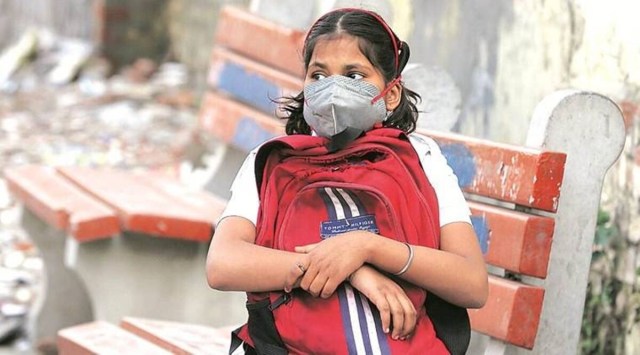- India
- International
Yoga, meditation, social bonding: as students return to Punjab schools from today, focus on emotional well being
Observing that children might face some issues in adjusting to the school environment after such a long gap, the Ministry has instructed the schools to assess each student upon return.
 the MIS-C can affect organs like heart, liver and kidney in children as post COVID complication and not as an active COVID case.(Representational)
the MIS-C can affect organs like heart, liver and kidney in children as post COVID complication and not as an active COVID case.(Representational)Yoga exercises, meditation, encouraging them to share their feelings and emotions and ensuring social bonding despite social and physical distancing are among some of the measures and guidelines that Centre and the CBSE have asked to ensure as students of classes 9 to 12 return to schools in Punjab Thursday after a long gap of nearly six months following the Covid-19 disruption.
While issuing the SOP for Unlock 5.0, the Centre had left it to the states to take a call on the schedule of reopening schools after proper assessment of the Covid situation within their territories. Punjab government had announced graded reopening of schools from/after October 15 allowing only students of classes 9 to 12 with the parental consent.
Now, the Department of School Education & Literacy (Ministry of Education) and the Central Board of Secondary Education have directed the schools to ensure that for effective “Learning With Social/Physical Distancing”, students’ emotional and mental well being is taken care of and they are encouraged to express, share their feelings and emotions with their teachers, parents and friends. The guidelines state that any symptom of stress or anxiety in a student must be taken care of immediately; special care should be taken of students affected by Covid-19 and they can be made to practise yoga or meditation in classrooms to make them feel comfortable. The guidelines further say that ensuring mental well-being of teachers is also of utmost importance and they should be encouraged to write a ‘daily reflective diary’.
The guideline document says that reintegration of students into school may be taken on priority after reopening. “Teachers must talk and sensitize all students about Covid-19 and related myths, social stigmas and fears. Care should be taken to ensure social and emotional bonding despite having to maintain physical/social distancing..Children may be discouraged from sharing copies, books etc and how they will help each other this way in reducing the risk of spreading the disease may be explained to them,” it states.
Further advising teachers to make students practise yoga in classrooms, the Ministry document says, “Some yogic exercises may be practised in the classroom to make children comfortable. For example, micro yogic practices like rotation of head and shoulder, touching toes and stretching for primary children. Some simple asanas like Tadasana, Vrikshasana for children of class 6 onwards… If a sitting place is available then Swastikasana, Vajrasana can be practised. Breathing practises like Kapalbhati, anuloma viloma, pranayama can be organized”.

The ministry has also instructed schools to take special care of children with special needs and those affected by Covid-19. “Address concerns of children with special needs: Focus on the most vulnerable students (homeless/migrated students, students with disabilities, and students directly affected by Covid-19 through a family death or hospitalization) to prioritize their needs,” it states.
Observing that children might face some issues in adjusting to the school environment after such a long gap, the Ministry has instructed the schools to assess each student upon return.
“Ensure smooth transition of students from home-based schooling during lockdown to formal schooling. Assess each student upon return to school by adopting informal methods and prepare individualized instructional plans for students with special needs and also those students who were unable to access online study material during lockdown in order to help them catch up and mitigate learning loss. It is advisable that during the first 2-3 weeks of resumption of classes, students are to be allowed gradually to get used to school life again, either by focusing on review of lessons taught online or through any other activity,” says the document.
To bring back the children who might have dropped out during lockdown, the Ministry says, “Back to School campaign may be initiated with particular focus on out of school and marginalized children especially girls, children with disabilities, children of migrant workers and children belonging to SC/ST communities. Vocational education and career guidance programmes may be expanded to facilitate school to work transition of adolescents on completion of school, keeping in mind economic fall out of Covid-19 pandemic”.
The Ministry, in its guidelines, has stressed on the emotional and mental well-being of both students and teachers. The guidelines say that both students and teachers must be encouraged to share their feelings and express openly.
“It is natural to feel stress, anxiety, grief and worry during and after a disaster/pandemic and children are indeed the most vulnerable ones at such times. Therefore schools are advised to take note of any symptoms of stress in their students and take appropriate action in collaboration with parents. It is advisable that teachers, school counsellors and school health workers should work in unison to ensure emotional safety of students. Tough times might also have impacted the well-being of teachers which in turn might affect their ability to lead and manage their students… so it is of paramount importance that mental well-being of teachers should also be taken care of in equal measures. Concise module on counselling can be developed to ensure emotional stability, removal of anxiety and building-up self-confidence of children once they come back to school after a long gap,” says the document.
Some activities that have been recommended include: conversational activities in classroom to bring back normalcy, make students feel safe by emphasizing that child fatalities due to Covid-19 are negligible but children can get it and transmit if they behave unsafely, share life stories, acknowledge and share their emotions. Students can share their feelings and emotions with teachers, friends, parents and other family members.
“Teachers can maintain a daily reflective diary, perform yoga, meditation etc and write day’s experience before going to bed,” says the document
Apr 26: Latest News
- 01
- 02
- 03
- 04
- 05







































